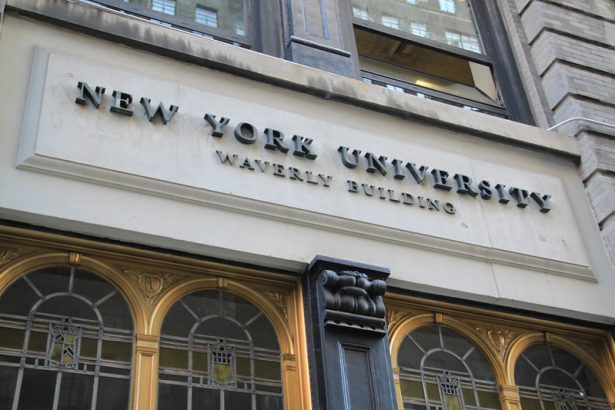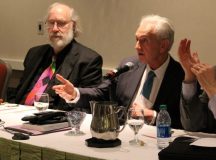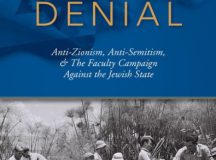The members of the Alliance for Academic Freedom Executive Committee – Cary Nelson (Chair), Susana Cavallo, David Greenberg, Rebecca Lesses, Jeffry Mallow, Stan Nadel – explore the botched launch of The Institute for the Critical Study of Zionism as the latest instance of organised anti-Zionism in the academy. ‘Founded on the rock of anti-Zionist animus,’ and with ‘no other mission or reason for existence,’ the authors identify a project intent on demonising and damaging the Jewish State and on stifling truly free academic expression.
A new purportedly academic enterprise – The Institute for the Critical Study of Zionism – on 21 September announced an October 2023 conference with a very explicit political agenda.[1] The event’s two days were to be split between two campuses, New York University and the University of California Santa Cruz, so as to help people on the two coasts attend at least one day in person and organise political action in their respective regions. NYU and UCSC have both since withdrawn permission for the conference to be physically held on their respective campuses. UCSC distanced itself from the events on 5 September, then, as criticism intensified, issued a revised and more pointed statement on 8 September, declaring ‘at no point in time has UC Santa Cruz endorsed the upcoming conference’. A couple of sponsors dropped out, but one faculty member, Judith Butler, joined the ICSZ Advisory Board despite the debacle. The organisers are now left with the rather odd formulation that the conference will be held in ‘the intellectual space’ of UCSC and NYU. That could arguably be anywhere or nowhere on earth. The ICSZ’s premier announcement has been a public relations disaster.
Academic Anti-Zionism and Academic Norms
Yet the whole incident has in fact said a great deal about organised anti-Zionism in the academy, its attraction to antisemitic tropes, and the extreme difficulty of squaring unrelenting anti-Zionism with the norms of academic research and academic freedom. As a result we now have clear evidence that uncompromising statements about academic anti-Zionist goals reveal an unbridgeable chasm between those goals and the norms of the academy. The future of the ICSZ is likely in doubt, but it is important to learn what we can from these unfolding events.
The conference title, ‘Battling the “IHRA definition”: Theory & Activism,’ actually only hinted at its purpose. The conference was to be the opening salvo in a broad war against the Jewish state. The ICSZ is designed to give that war a new level of pseudo-academic respectability and prestige.
As many readers will know, in 2016 the International Holocaust Remembrance Alliance (IHRA) adopted a definition of antisemitism designed to help individuals and institutions of all kinds in understanding the myriad manifestations of contemporary antisemitism, including its relationship to anti-Zionism. Over a thousand countries or organisations have since adopted the definition. But anti-Israel activists claim that it chills anti-Zionist speech and opposing the IHRA definition has become a priority in certain academic and activist circles. Both support for and opposition to the IHRA definition have acquired considerable symbolic force, representing overall support for or opposition to Israel’s existence. The ICSZ no doubt chose its opening conference topic in part because it carried that political freight.
The connection between the conference’s ostensible focus on the IHRA definition and its underlying mission is made clear by the closing words of the conference manifesto’s opening paragraph. There, the conference organisers declare their intention of building ‘knowledge about how “the IHRA definition of antisemitism” both amplifies and hides repressive power and state violence.’ They regard the IHRA definition, in other words, not as an effort to define contemporary antisemitism but as an instrument of Israeli state power. In response, the conference will ‘share theoretical insights and organizing tools to support resistance,’ thereby ‘building attendees’ support networks to push back on IHRA campaigns.’ The target audience is limited to those who share the group’s opposition to the IHRA definition: ‘This is a conference for academics and activists who are battling the “IHRA definition.”’ But the definition, for the ICSZ’s organisers, symbolises Zionist aggression. This effort to politicise the IHRA definition utilises an approach we have not seen before.
‘Antithetical to our values as a university’: The ICSZ’s Anti-Zionist Test
Politically one-sided academic conferences are not uncommon. But the organisers initially went one step further. They demanded a pledge of allegiance to anti-Zionism: ‘We ask that all who attend confirm their agreement with the points of unity before registering.’ All those who would enter were required to pass a political litmus test, swearing to what amounts to an anti-Zionist loyalty oath. That demand for a participant loyalty oath is likely what led to both campuses refusing to host the event. Certainly, it is worth discussion whether it would be appropriate for any campus to devote resources to such an event.
By demanding a pledge of anti-Zionism, the conference would have forbidden participation to any and all students or faculty who may believe in nothing more than allowing Israel to exist as a Jewish state. That would have been an unconscionable restriction of academic freedom and a form of invidious discrimination. For a university to prohibit people from participating in a campus event because of their political views or personal identities would have been extraordinary. The ICSZ sought to do both. And when they were apparently compelled to stand down they offered neither an apology nor a modified mission statement.
Faced with rapid public denunciation, along with some likely internal blowback at UCSC and NYU, the organisers deleted the loyalty oath demand. At the same time, however, they closed the event to additional presentations. The move represented strategic cynicism, since all the accepted presenters would have already dutifully signed the pledge. No one else need apply. Meanwhile, one assumes that all or most of the ICSZ’s organising committee had endorsed the imposition of the loyalty oath. The ICSZ as a consequence of this history will be forever identified with its assault on academic freedom. Both IHRA definition supporters and opponents should have found a political loyalty oath unacceptable for an academic event. UCSC’s strong revised statement makes that clear:
A conference that limits participation based on political ideology is antithetical to UC Santa Cruz values as a public university and constitutes potential viewpoint discrimination in violation of the First Amendment along with potentially impinging on the academic freedom of prospective attendees.
But other questions have been raised by the whole incident. If we conclude that academic anti-Zionism raised its true colors at UCSC and NYU, should concerned faculty generalise about its incompatibility with the norms of academic life? Have some of us learned that academic anti-Zionism’s ‘critical study of Zionism,’ with its ideologically enforced and pre-existing conclusions, merits no support from the academy? Faculty are free to declare anti-Zionist and antisemitic agendas, but that is no reason to institutionalise them.
It may well be that neither UCSC nor NYU had offered any financial support to the ICSZ. We should eventually know. The ICSZ’s director, Emmaia Gelman, is a trustee of her family foundation, the Sparkplug Foundation, which has a history of supporting anti-Israel initiatives. Whether its current guidelines would have enabled support for this project is unclear, but that too should eventually be revealed. As a bio notes, Gelman ‘is at work on a critical history of the Anti-Defamation League (1913-1990) as a Cold War neoconservative institution.’ All of those involved in the ICSZ have anti-Zionist intellectual histories.
In any case, political groups and academic units at UCSC and NYU had long established their anti-Zionist credentials. In 2023 the UCSC chapter of Students for Justice in Palestine distributed a series of its posters on social media: the slogans included ‘F*** Zionists, Y’All R Ugly,’ ‘75 Years [of] Resistance, Until Return, Liberation,’ ‘From the River to the Sea,’ and ‘End Settler Colonialism Violence, Zionism [equals] Genocide.’ Anti-Zionist students at NYU’s law school in April 2022 complained in a public letter that ‘the Zionist grip on the media is omnipresent,’ an antisemitic accusation that followed years of BDS advocacy by the NYU graduate student employees’ union. Faculty members on both campuses and several academic units have comparable records of anti-Zionist activism. Programmes at both campuses unsurprisingly signed the May 2021 ‘Gender Studies Departments in Solidarity with Palestinian Feminist Collective’ statement.
Could that history help win this new anti-Zionist enterprise a permanent home on one or both of the two campuses? The neutral sounding ‘critical study of’ was intended to lend the ICSZ a veneer of scholarly objectivity, but its planned inaugural event, the October 2023 conference, made it clear that ‘critical study’ actually entails nonstop attacks on Zionism and on the Jewish state. The ICSZ’s website includes a 14,000-word FAQ section, consisting of four anti-Zionist statements that further define the mission. The firestorm of condemnation surrounding the conference announcement may well now make institutionalisation at UCSC or NYU impossible, though the faculty and graduate student hostility toward Israel on both campuses might lead to different results.
‘No Debate’ Academia
The ICSZ and its founding conference are to be protected by a cone of political conformity: no dissenting views will be heard. Genuine academic debate will be ruled out of order. The organisers evidently believe there is nothing useful to be learned from those who do not share their views. Such hostility to open debate has long been a part of the anti-Zionist project: the BDS Movement has endorsed an ‘anti-normalization’ agenda that increasingly rejects all dialogue with political opponents. The movement apparently believes itself already in possession of the truth. The Institute for the Critical Study of Zionism explicitly embraces BDS and enshrines anti-academic anti-normalisation in its self-definition. Ironically, the organisers characterise themselves as champions of academic freedom and unfettered inquiry.
What, one may ask, is the ‘Institute’ afraid of? In reality, informed debate is as likely to enrich supporters as opponents of a political position. You can learn as much from your enemies as your friends. The risk that dedicated IHRA Definition opponents will have their views reversed by open debate, moreover, seems vanishingly small. Perhaps they simply believe exposure to dissenting views is a clear waste of time. They already know justice from injustice, right from wrong. The ‘Study of Zionism’ is aimed exclusively at eliminating Israel from the earth. But this of course is not study.
As the points of unity manifesto makes clear, the ferocity of the ICSZs political commitment is unqualified. Here, quoted from the ICSZ’s declaration are the first three (of seven) bullet points that launch its agenda:
– Zionism is a settler colonial racial project. Like the US, Israel is a settler colonial state. The Institute opposes Zionism and colonialism, and abides by the international, Palestinian-led call for Boycott, Divestment, and Sanctions.
– Studying Zionism – its direct work for the Israeli state and its “other work” – is politically necessary. The rigorous, transnational study of Zionism as a political ideology and practice, and of Zionist institutions as political actors, is necessary for political pursuits from democracy to decolonization.
– Academic research is not politically or morally neutral. The Institute’s research aims to interrogate and intervene in racism, colonialism, ethnic cleansing, and the appropriation of liberatory rhetoric by repressive political forces, among other harms.
The organisers seek to profess their political objectivity and historical sensitivity by declaring both Israel and the US to be settler colonial states, but they call for a boycott of Israel alone, thereby displaying the standard hypocrisy of international comparisons grounded in anti-Zionism. In yet another elision, they represent Zionism as an Israeli state project, when the opposite is the case. Zionism is the national liberation project of the Jewish people that led to the creation of the Jewish state, not a product of that state. That core purpose no longer animates contemporary Zionism; it is no more than an historical relic. As the FAQ page insists, Zionism now ‘refers to support and advocacy for the Israeli state, the insistence that it remain a Jewish ethnostate, and the ongoing dispossession and violence against Palestinians produced (and indeed required) by that project.’ But of course anti-Palestinian violence has never been a defining element of Zionism, only at times an accompaniment to certain forms of it; the millions of Zionists who continue to advocate for a two-state solution stand as proof of the falsity of the ICSZ’s claim. More broadly, the ICSZ nowhere acknowledges that Zionism is central to the personal and collective identity of millions of Jews worldwide, not simply a form of political ideology. The ICSZ’s proud rejection of research neutrality amounts to a rejection of the disinterested pursuit of truth as a research principle. Research is to be valued according to its conformity to anti-Zionism.
Dressing up Conspiracism as Critical Thinking
Elsewhere the FAQ page elaborates the extent of its intolerance to any form of Zionism:.
Zionism extends to Zionist institutions and logics, their role in the production of racial and gendered knowledge, their function in naturalizing and reproducing structures of militarized colonial violence, and the ways that Zionism interplays with, and relationally shapes, bigger spheres including politics, culture, the movement of capital, and ways of thinking about the world.
Behind the clotted academic jargon is the allegation of a vast Zionist conspiracy. The ICSZ claims it will promote
research on the role of Zionism in the development of US hate crimes policy and homonationalism, the linkages between Zionist and Hindutva politics, the ties between Zionist institutions, the Israeli state, and the evangelical Christian right, the Zionist surveillance technology deployed at the U.S.-Mexico border, the destruction of Indigenous agriculture in Guatemala, the centrality of Zionism in the opposition to and attempted cooptation of ethnic studies in the United States, and the fostering of post-9/11 interventionist human rights politics with regard to North Korea.
Israel’s power and influence extend everywhere. We are in the presence here of the insidious, antisemitic trope of the worldwide conspiratorial Jewish octopus so often depicted by the Nazis.
Part of what is insidious about the ICSZ’s conspiratorial menu is that it mounts a project based on guilt by association. Perfectly credible research on evangelical Zionism, which has already produced a substantial scholarly literature and thus represents no innovation, is embedded in a series of far more speculative and even delusional claims of malign Zionist influence. Certainly, the suggestion that Israel’s hostile relations with North Korea are responsible for Western condemnations of North Korea’s human rights violations belongs in the latter category. Christine Hong of UCSC, one of the ICSZ’s founders, has been condemning human rights complaints against North Korea for at least a decade. Solidarity with North Korea would obviously not enhance the ICSZ’s public profile. Moreover, any act by individual Israelis, regardless of their connection to the Zionist idea, is attributed to the Zionist monolith.
Although the seven ‘points of unity’ have been dropped as requirement for conference attendees, they still define the ICSZ’s mission:
Our points of unity serve as common ground for the ICSZ’s community of activist and academic researchers. Starting from this common ground allows for study, debate, and true academic freedom to pursue critical anti-Zionist research unhampered by constant, derailing demands, bullying, smearing, and distractions. Perhaps most importantly, it allows the work to begin without having to declare or justify its first principles, which are a decisive rejection of the animating values of the neoliberal, colonial university.
Any rational criticism of this academic enterprise is castigated as bullying and smearing. Like all the ICSZ’s prose it mixes its programmatic anti-Israel convictions with suggestions that academically presentable work – ‘study, debate, and true academic freedom to pursue critical anti-Zionist research’ – can nonetheless take place under its umbrella. It is nothing more than an ‘effort to subject Zionism to analytical study.’ Just so long it is clear that ‘Zionism is, after all, the core, avowed ideology of a global military power, Israel, with an entrenched history of brutal racism and violent repression.’
A new ‘Antisemitism of Reason’?
In more than one respect the ICSZ represents a new stage in the degradation of the humanities and social sciences and the destructive politicisation of the university. The departments that signed the May 2021 anti-Zionist statement were clearly embracing that political mission very broadly. Curriculum, research, student and faculty recruitment, and professional evaluation would henceforth seek to inculcate anti-Zionism. Though these departments now officially embraced anti-Zionism, they were not, however, founded with that purpose. Moreover, they would likely include some activities unrelated to Israel or Jewish identity.
But the ICSZ is different. It is founded on the rock of anti-Zionist animus. It has no other mission or reason for existence. Its formal recognition by UCSC or NYU could well lead a few other institutions to create departments or programmes of anti-Zionism. But for many Jewish students and faculty they would in fact function as Departments of Antisemitism. Not programmes to study the longest hatred but programmes to promote its contemporary anti-Zionist form.
It would not be the first time either university institutes or external groups mounted antisemitic campaigns under the cover of studying the Jew. As scholars have documented for decades, Nazi Germany pursued the antisemitic ‘study’ of Jews and Judaism in a perverse version of pseudo-scholarship in the service of politics and ideology. Scholars have examined both the intellectual and institutional character of this project, and we need to be prepared to do so again if the ICSZ thrives. Hitler called for an ‘antisemitism of reason’ to help win respectability for the Nazi regime’s policies. German university faculty rose to the occasion. Now faculty members are doing so in the service of uncompromising anti-Zionism. We may yet confront another time when degraded universities attempt to grant antisemitism academic legitimacy.
[1] Much thanks to Joe Lockard for suggestions offered regarding the evolution of the ICSZ.




































